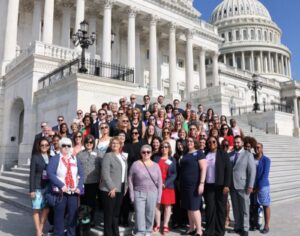Hospice Priorities for Fall 2021
As the beltway is entrenched in a busy time of the year, focusing on a big infrastructure and reconciliation package, funding the government and raising the debt-ceiling, the Hospice Action Network is working closely with the hospice and palliative care champions on the Hill, and within the Department of Health and Human Services, to advance hospice and palliative care priorities which will expand access to high quality care for patients and families experiencing serious illness and the end of life and is committed to keeping you informed.
Looking through the fall and towards the end of the year, we are firmly focused on three major priorities:
Community-Based Palliative Care
The National Hospice and Palliative Care Organization has been at the forefront of expanding access to hospice and palliative care for more than forty years.
Right now, Medicare beneficiaries are in need, because they cannot access home-based palliative care. This means that patients and families miss out on the wealth of resources and support that palliative care providers can offer. When patients have access, palliative care providers address physical, intellectual, emotional, and spiritual needs, and facilitate patient autonomy and choice.
To address these needs, The National Hospice and Palliative Care Organization and the Hospice Action Network have been leading efforts to expand access to palliative care across the country.
In July, Senators Rosen (D-NV), Barrasso (R-WY), Fischer (R-NE), and Baldwin (D-WI), introduced the Expanding Access to Palliative Care Act (S. 2565), which would direct the Innovation Center at the Center for Medicare and Medicaid Innovation (CMMI) to implement a Community-Based Palliative Care Demonstration. Through this demonstration, CMMI would test the impact of a Community-Based Palliative Care on both patients and the Medicare trust fund.
Access to palliative care where a patient calls home will improve patients’ quality of life, allowing patients and families to spend more time together, and less time in doctors’ offices and emergency rooms. It will also protect medically vulnerable people from unnecessary exposure to COVID-19 and other illnesses.
Please join HAN in urging your Senators to cosponsor this bill.
Telehealth
The expansion of telehealth has been one slim silver lining of the COVID-19 pandemic. During the Public Health Emergency, which was first declared on March 17, 2020, and has been extended repeatedly since, hospice patients, families, and providers have benefited from two key telehealth flexibilities: the inclusion of home as an originating site for telehealth visits, which means that patients can meet with providers via telehealth from home and allowing the required face-to-face visits prior to recertification for the hospice Medicare benefit via telehealth.
Both flexibilities are good candidates for extension beyond the end of the Public Health Emergency. Allowing home as an originating site for telehealth visits eliminates a wasteful and unnecessary trip to a third party provider’s office for hospice patients. There is no reason that a patient should need to risk exposure to COVID-19 and other illnesses, or waste time or resources traveling and sitting in waiting rooms. For many patients, such travel is a burden, which has been removed during the public health emergency and should not be needlessly imposed upon them again.
Visits between hospice providers and patients prior to recertification for the hospice benefit are also an ideal use of telehealth. These low-touch visits can easily and effectively be done via new technologies, and using telehealth for this purpose, again, can protect medically vulnerable patients and providers, while saving doctors windshield time, freeing them up to see more patients.
On the Hill, Democrats and Republicans alike agree that some telehealth flexibilities which have been granted during the Public Health Emergency should be extended. Therefore, we expect that a large telehealth package, including many smaller flexibilities, like the ones we support, will be passed shortly before the expiration of the Public Health Emergency. We are working every day to ensure that these, flexibilities which improve the quality of life of the most medically vulnerable Americans, are included in that bill.
To support patients and providers, NHPCO supports two bills, The Telehealth Modernization Act (S. 368/H.R. 1332), and the CONNECT for Health Act(S. 1512/H.R. 2903), each of which extend these key flexibilities.
Workforce Issues
COVID-19 has exacerbated existing workforce shortages across many areas of health care, including hospice and palliative care.
There is a shortage of adequately trained hospice or palliative care providers, and the current rates of educating and training medical professionals in palliative care will not be sufficient to encouraging Americans access to quality palliative care. Estimates show that there will be no more than 1 percent growth in the palliative care and hospice physician workforce in the next 20 years, while the number of people eligible for palliative care will increase by over 20 percent. Without a boost for palliative care education and training, there will be only one palliative physician for every 26,000 seriously ill patients by 2030.[1]
To resolve these problems, NHPCO and the Hospice Action Network support The Palliative Care and Hospice Education and Training Act (PCHETA). This bill addresses this workforce shortage by:
- Establishing Palliative Care and Hospice Education Centers which would provide in-depth and improved training for physicians, nurses, social workers, chaplains, pharmacists, and other allied specialties in palliative care. These education centers would also offer fellowship programs to provide training for faculty members in various medical institutions to enhance knowledge and care skills for patients facing life-limiting illnesses.
- Expanding Palliative Care Research by directing the National Institutes of Health to allocate existing funds for research to advance clinical practice and care delivery for patients with advanced and life-limiting illness.
- Providing Academic Awards and Career Incentive Awards to promote career development of board certified/eligible physicians in palliative medicine and offer grants and contracts for eligible healthcare professionals who agree to teach or practice in the field of palliative care for several years.
- Establishing a National Awareness Campaign which will inform the public and healthcare professionals about this important field of practice and ensure it is equipped to serve the increasing need of patients.
This bill has been introduced in the House of Representatives several times and is expected to be reintroduced by Representatives Yvette Clark (D-NY) and Tom Reed (R-NY) later this fall. It consistently receives wide bipartisan support. We are hopeful that as Congress turns its attention from addressing the immediate crisis of the COVID-19 pandemic toward addressing the long term gaps in our health care system which the pandemic exacerbated, this could move within a larger health care package at the end of the year.
In the meantime, Representative Clark is advocating for funding for palliative care training to be included in the reconciliation bill which is currently being hotly debated. While no details of the ultimate bill can be confirmed now, NHPCO will continue to advocate for funding for this important work through PCHETA and otherwise.
The Hospice Action Network is working every day to advance these policy priorities. Sign up to stay up to date on hospice and palliative care policy, and take action to support patients, families, and providers.
[1] AAHPM. “PDF.” American Academy of Hospice and Palliative Medicine, 2018: http://aahpm.org/uploads/advocacy/AAHPM%20Workforce%20Flyer%20-%202018.pdf



